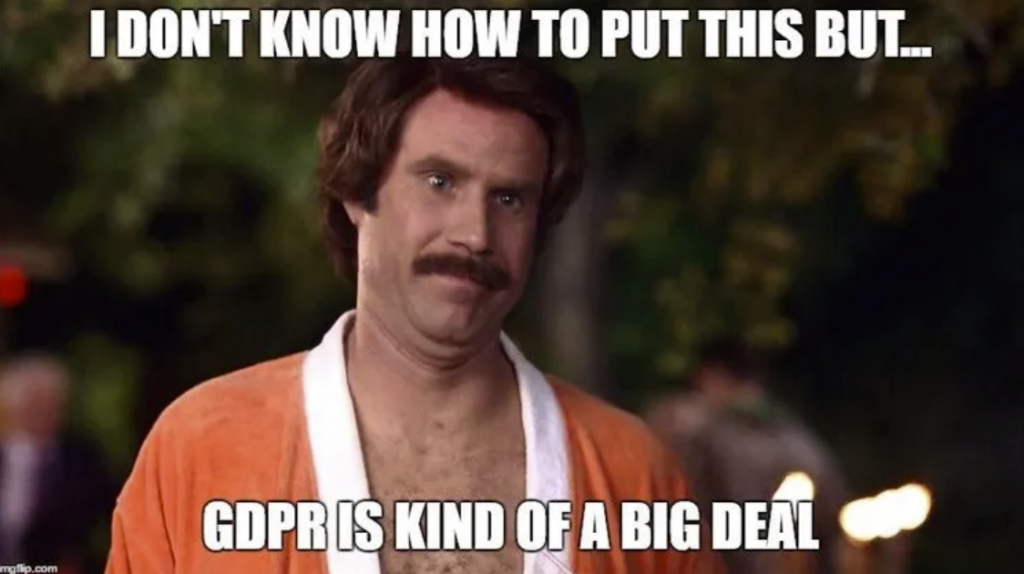
Exciting News! Outbase unveils its groundbreaking AI Assistant – your new campaign creation co-pilot. It's a smarter, faster way to reach your sales goals!


GDPR… four letters that hold the key to keeping your business in the safe zone of data protection.
But if you’re feeling lost in the rules, you’re not alone. In this blog, we’ll guide you through the need-to-knows that’ll keep you on the right side of the GDPR regulations.
The General Data Protection Regulation (GDPR) is an important privacy law in the EU. It lays out rules for how businesses collect, process, and store personal information – making sure peoples’ data is treated with care and kept safe.
If you’re gathering personal info about anyone within Europe and the EU, you need to comply with GDPR to keep things legit and protect their privacy. So it’s kind of a big deal.

Image source: digit.fyi
Apart from being a legal requirement, sticking to GDPR helps your business to:
If you’re processing any form of personal data (think cold emails, cold calls, or even selling through social media,) your business must comply with GDPR.
If you don’t follow GDPR laws, brace yourself for some serious consequences. We’re talking fines of up to €20 million or a whopping 4% of your company’s total income. Ouch 😖.
But it’s not just the financial hit you have to worry about. Breaking GDPR rules can wreak havoc on your reputation and make customers lose trust in you.
Just look at what happened to Facebook owner Meta: they got slapped with a €265 million fine because users’ personal data (including their full names, phone numbers, birth dates, and locations) ended up on an online hacking forum.
And Google Ireland didn’t escape the GDPR enforcers either. They had to cough up a hefty €90 million fine in 2022 because YouTube’s cookie consent procedures were found to be seriously lacking.
Yikes. But it goes to show that GDPR rules apply to everyone, no exceptions. So play by the book, protect people’s data, and avoid these nightmarish consequences.
Let’s take a look at those rules, and why they’re in place 👇.
As the wise Monica Geller once said: “rules help control the fun”. GDPR rules are actually pretty simple to follow, and once you start building them into your business processes, they’ll soon be second nature.
Here’s the rules you need to follow:
This includes obtaining explicit consent from individuals. When you have a genuine purpose and their enthusiastic thumbs-up, trust is built and privacy is honored.
You also need to inform them of how you’re using it, and who you’re sharing it with. Keep it short, sweet, and crystal clear so everyone knows what’s happening behind the scenes. Make sure they know they can ask for the info you have on them at any time.
Keep the data lean and clean, making sure you only gather and use what you really need for your business activities.
Get rid of any inaccurate or outdated data. By keeping things fresh and up-to-date, you’ll be the champion of accuracy and wielder of clean, reliable information.
When it comes to personal data, it’s your sacred duty to keep it safe and sound. Arm yourself with the right technology and strategies to ensure data security is always on lockdown. No unauthorized access or disclosure.
Individuals have the right to unlock, amend, or request deletion to their information as they see fit. It’s all about putting the power back in their hands. Having a process in place for doing this – before someone asks – will build trust with your customers, and make for better data management within your organization.
When you kick off a new project or dive into system development, make sure privacy and security are built into things from day one, don’t just add them as an afterthought.
When you share personal data with third-party processors, make sure you have rock solid contracts and ground rules in place. Lay out the responsibilities of each party to ensure the utmost data protection.
As soon as you catch wind of a breach, it’s game time. All breaches need to be reported to the Information Commissioner’s Office within 72 hours, and you’ll need to reach out to individuals whose personal data got caught in the crossfire. It’s all about accountability and transparency.
Regularly review and update your data processing activities to ensure you’re always on the right track. Regulations do get updated over the years, so keep on top of the latest things and dazzle everyone with your commitment to keeping personal information in check.
We love data… our whole business is built on it! So your prospecting campaigns wouldn’t be possible if we weren’t GDPR compliant.
Every contact in our database has been verified while respecting data privacy, so you can reach out to new potential customers with total peace of mind. See how it works.